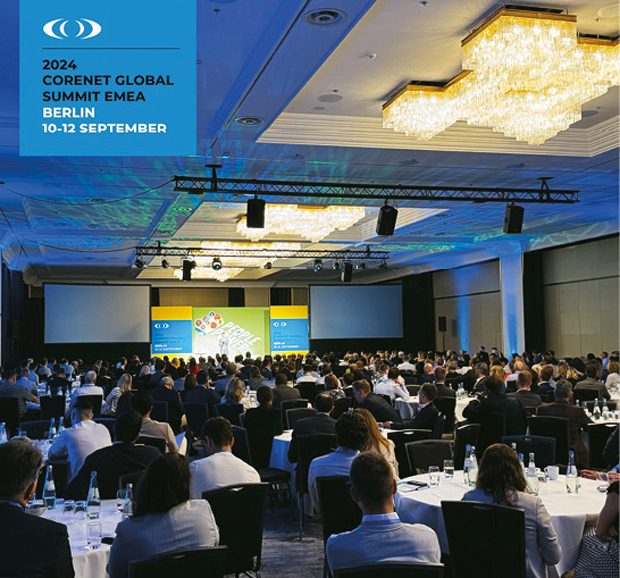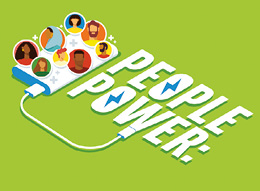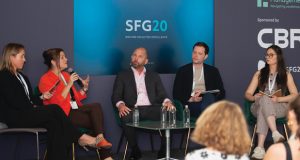 The CoreNet Global Summit 2024 focuses on the human element and how connection shapes the future of work. Sabrina Stubbs, Account Director, Magenta Associates reports
The CoreNet Global Summit 2024 focuses on the human element and how connection shapes the future of work. Sabrina Stubbs, Account Director, Magenta Associates reports
What are places without people? This was the key theme that underpinned this year’s CoreNet Global Summit 2024, held at the InterContinental in Berlin. Although traditionally a corporate real estate event, the summit embraced the theme of ‘People Power,’ with a focus on nurturing human connections. Where the ‘pandemic of loneliness’ is gaining momentum—despite the abundance of technological means to connect—this aspect of workplace strategy is more crucial than ever.
HUMAN CONNECTION
The summit opened with a powerful keynote delivered by human connection expert, Simone Heng. Heng highlighted that loneliness can be more harmful to health than smoking, alcohol, or obesity. Her message emphasised the importance of reconnecting with oneself to foster deeper, more authentic relationships with others. She introduced five pillars of human connection: rapport, commonalities, vulnerability, service, and self-connection—principles that transcend geography and culture. Heng urged the audience to rethink traditional ‘in-office days’ and presented a strategic model to help teams remain accountable for their connectedness.
In an era where asynchronous communication is on the rise, real-time, face-to-face interaction is becoming a rarity, exacerbating social anxiety, particularly among younger generations. Drawing on the German concept of Herzensbildung—the cultivation of one’s heart to perceive the humanity in others—Heng challenged attendees to rethink how departments such as CRE, HR, IT, and marketing collaborate to enhance the employee experience and performance.
MORE THAN JUST A DESK
In a session titled ‘The face of corporate real estate: strategic impact and collaboration,’ Mary Louise Gray, VP of workplace real estate & facilities (WREF) at GSK, highlighted the significant evolution of the workplace. Once merely a desk, the workplace has transformed into a flexible, choice-driven environment. Gray discussed how corporate real estate, once a siloed function, now collaborates closely with HR, finance, procurement, and legal departments. The focus is increasingly on creating environments that foster connections and contribute to society.
The panel discussed how companies can measure the impact of CRE on corporate culture, especially in terms of fostering a sense of belonging and enhancing employee fulfilment. As Gray put it, work should be about forming a community of like-minded individuals who align with shared goals. Today’s workforce also seeks employers committed to environmental responsibility, reinforcing the broader role corporate real estate plays in employee engagement and retention.
DOING GOOD BUSINESS
During the ‘Good business: leading the way’ panel, John Hamilton, Chief People Officer at Bellrock, stressed that the mark of a good company is how it looks after its people. “We should not underestimate the impact individuals can have,” Hamilton said, adding that a bottom-up approach, where ideas and change come from all levels, can be more effective than a top-down approach. While doing the right thing often requires more input and effort, it shouldn’t serve as a barrier to progress. He encouraged organisations to tap into their pool of talent to contribute to the ‘good business’ conversation.
This idea was echoed by Mitakshi Sirsi, Sustainability Director at WILL+Partners, the workplace strategy arm of Broadway Malyan. Sirsi argued that companies should dismantle silos and foster collaboration. “Where overlaps exist, change often follows,” she said, reinforcing the idea that ethical and sustainable practices require collective effort.
VALUE VS KPIS
During the panel ‘Shared net zero goal: why owners and occupiers need to work together,’ Mariana Duarte, Global Account Director at Johnson Controls, called for a shift from traditional KPIs towards value-based delivery. Using the example of a rental car, she asked: “Are you hiring a car or hiring mobility? Is the car just a car, or is it convenience?” Duarte challenged service providers and landlords to re-evaluate their approach, suggesting that performance contracts should evolve to reflect value rather than simply measurable outputs.
CULTURE IS CRUCIAL
In an interactive session hosted by Phil Ratcliffe of Code Advisory and Stephanie Davies from Laughology, participants were encouraged to define what ‘culture’ truly means. The session explored the critical role of social interaction in the workplace. Loneliness, they noted, can lead to lower productivity, disengagement, and absenteeism, while fostering social, inclusive activities can help build a culture of teamwork and companionship.
This session also emphasised the link between happiness, psychological safety, and workplace success. When people feel psychologically safe, they are more likely to take risks, grow, and contribute positively. Promoting human connection is vital to building a thriving, productive workforce—a key lesson the pandemic has taught us, with more people now valuing time spent with each other.
The CoreNet Global Summit 2024 offered more than the expected corporate real estate insights. It was a time for reflection, a reminder of the importance of human connection in the workplace. While discussing strategies for meaningful change, the summit highlighted that corporate real estate is no longer just about physical assets—it’s about people. Shane Fentress, Managing Director – operations Europe, of Hines Europe perhaps summed it up best: “When good minds come together, great benefits can be achieved.” What are places without people, anyway?
FURTHER INFORMATION
https://www.corenetglobal.org/attend-summits-events/past-events-resources






